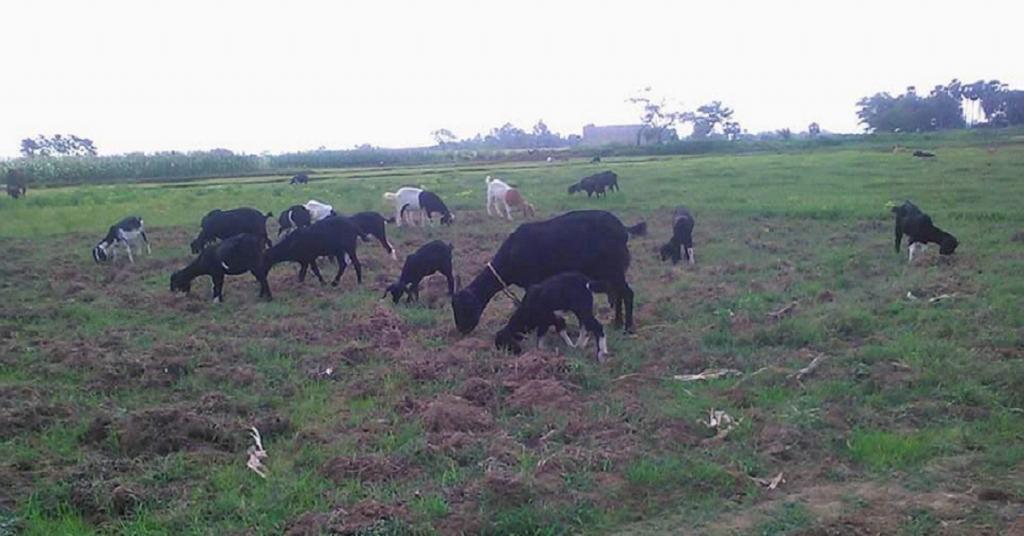
Finding stability and profit rearing animals post lockdown Many in rural Bengal say it is a better alternative to migration
23, Nov 2022 | Mohammed Ripon Sheikh
Birbhum’s Jasim Sheikh is a graduate from Burdwan University. After a few years of struggling to get a job, he arranged for some money to lease a piece of land and open an animal farm, mainly raising goats. But the road to opening the farm wasn’t easy. He applied for a loan in various banks and even though there are governmental subsidies for small animal husbandry and ventures, he had to go through numerous stages of paperworks to finally start his own animal farm. Jasim says, “ rearing goats is quite a profitable venture. Of course, you need money to raise goats. Plus you’ll have to fight the criticism of relatives, neighbours and other village people,”
Apart from agriculture, a large section of Bengal’s population depends on animal husbandry for their livelihood. Rearing chicken, fish and goats is a profitable venture, in today’s times. Just like the Indus Valley civilization that used to rear cattle along with agriculture, we have been able to follow similar footsteps. In the last few decades, workers from Bengal have been going to other states for work. Many took a break from farming and turned their attention to masonry. Many struggled to find odd jobs in their own regions. But after the devastating pandemic and lockdown, a lot has changed in the rural areas.
A large section of villagers no longer want to go to work in foreign states. They want to be self-sufficient, to secure their well being and look after their families. Therefore, those who are unable to lease huge pieces of land for agriculture work or those who aren’t too keen on working for others, have turned their attention to agriculture and animal husbandry, just like Jasim. Hence, large farms of goats, chickens, ducks and other livestock have started to open up in villages like Birbhum, Malda, Murshidabad and Bolpur.
CJP’s Grassroots Fellowship Program is a unique initiative aiming to give voice and agency to the young, from among the communities with whom we work closely. These presently include migrant workers, Dalits, Adivasis and forest workers. CJP Fellows report on issues closest to their hearts and home, and are making impactful change every day. We hope to expand this to include far reaching ethnicities, diverse genders, Muslim artisans, sanitation workers and manual scavengers. Our raison d’etre is to dot India’s vast landscape with the committed human rights workers who carry in their hearts Constitutional values, to transform India into what our nation’s founders dreamt it to be. Please Donate Now to increase the band of CJP Grassroot Fellows.
Even though many people of the village criticise the lack of opportunities and initiatives that accelerate such initiatives, the youth have been trying to take things into their own hands and propel growth and opportunities in terms of finding funds and figuring logistics. It has proven to be extremely beneficial to those who have taken the risk as the chances of making hefty profits are high, in animal husbandry. According to reports, the Bengal agricultural marketing department is holding regular discussions with other departments, including food processing, animal husbandry and health, on how to utilise facilities that have been constructed by the government in the recent past to encourage more people to start their own ventures.
But there’s also risks associated with this, like any other business. Jasim says, “ Rearing goats is a profitable venture but many times the goats die due to various diseases, sometimes there’s a huge dip in demand and sometimes the supply-chain turns out to be faulty. We suffer a lot in times like these. One needs to be aware of all of the risks, take into account the reality of entrepreneurship and most importantly, pay close attention to the health of the animals they are raising.”
This report is part of CJP’s Grassroots Fellowship Program, and has been written by aspiring journalist and student activist Ripon Sheikh from Birbhum in West Bengal. In these reports Ripon looks at the people around him – migrant workers, the families they leave behind, agricultural labourers, women who do housework, rural artisans and young people, with a keen sense of compassion.
Meet CJP Grassroot Fellow Mohammed Ripon Sheikh

This young man, who has graduated with a B.Sc degree from Burdwan University, loves trivia. Sheikh’s passion to research and seek “unknown information about World History” has earned him many medals and trophies at various University and state-level Quiz championships, and youth festivals. Sheikh is a born orator and a natural community leader. He has the potential to represent his community, state and country at a global level one day. His immediate goal, however, is to find a job so he can support his parents.
Related:
What happens when a ‘school’ drives to the students?
How Sunderban’s Honey Collectors fight all odds to earn their living










